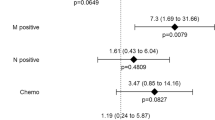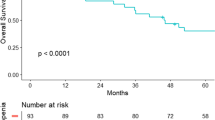Abstract
Background
Breast cancer is a disease that requires multimodality treatment, and surgical resection of the tumor is a critical component of curative intent treatment. Obesity, defined as a body mass index (BMI) > 30, has been associated with increased surgical complications. Additionally, sarcopenia, a condition of gradual loss of muscle mass, has been associated with worse breast cancer treatment outcomes. Sarcopenia occurs with increased age, inactivity, and poor diet leading to patient frailty, which can increase medical treatment complications. Even patients with high BMI can have sarcopenia (termed sarcopenic obesity). We investigated the association of sarcopenia with surgical complications for breast cancer.
Methods
A retrospective review was performed of patients diagnosed with breast cancer who received bioelectrical impedance spectrometry analysis of skeletal muscle mass and had surgery at our institution. Patient characteristics, treatment data, surgical type and complications were obtained from medical records. Multivariate logistic regression models were used to associate sarcopenia status and BMI with surgical complications, adjusted for other patient characteristics.
Results
We analyzed 682 patients with stage I to III breast cancer. On multivariable logistic regression controlling for age, BMI, comorbidities, and types of surgeries (lumpectomy, mastectomy with or without reconstruction), sarcopenia (p = 0.66) was not associated with surgical complications. Obesity was associated with a higher rate of surgical complications in patients who received mastectomy with reconstruction (p = 0.01). More complex surgical approaches were associated with a higher risk of surgical complications in our series.
Conclusion
Compared with those undergoing lumpectomy or mastectomy without reconstruction, patients undergoing mastectomy with reconstruction were more likely to experience postoperative complications and obesity was associated with higher risk of complication in the latter group. We did not identify a correlation between sarcopenia and rate of adverse surgical outcomes.
Similar content being viewed by others
Data Availability
the datasets generated during and/or analyzed during the current study are not publicly available due to confidentiality reasons but are available from the corresponding author on reasonable request.
References
Breast cancer statistics 2022 [Available from: https://seer.cancer.gov/statfacts/html/breast.html
Gradishar WJ, Moran MS, Abraham J, Aft R, Agnese D, Allison KH et al (2021) NCCN Guidelines(R) insights: breast Cancer, Version 4.2021. J Natl Compr Canc Netw 19(5):484–493
Zhong T, Hofer SO, McCready DR, Jacks LM, Cook FE, Baxter N (2012) A comparison of surgical complications between immediate breast reconstruction and mastectomy: the impact on delivery of chemotherapy–an analysis of 391 procedures. Ann Surg Oncol 19(2):560–566
Kwan ML, Chen WY, Kroenke CH, Weltzien EK, Beasley JM, Nechuta SJ et al (2012) Pre-diagnosis body mass index and survival after breast cancer in the after breast Cancer Pooling Project. Breast Cancer Res Treat 132(2):729–739
Chan DSM, Vieira AR, Aune D, Bandera EV, Greenwood DC, McTiernan A et al (2014) Body mass index and survival in women with breast cancer-systematic literature review and meta-analysis of 82 follow-up studies. Ann Oncol 25(10):1901–1914
Rolland Y, Czerwinski S, Van Abellan G, Morley JE, Cesari M, Onder G et al (2008) Sarcopenia: its assessment, etiology, pathogenesis, consequences and future perspectives. J Nutr Health Aging 12(7):433–450
Tsekoura M, Kastrinis A, Katsoulaki M, Billis E, Gliatis J (2017) Sarcopenia and its impact on quality of life. Adv Exp Med Biol 987:213–218
Shachar SS, Williams GR, Muss HB, Nishijima TF (2016) Prognostic value of sarcopenia in adults with solid tumours: a meta-analysis and systematic review. Eur J Cancer 57:58–67
Aleixo GFP, Williams GR, Nyrop KA, Muss HB, Shachar SS (2019) Muscle composition and outcomes in patients with breast cancer: meta-analysis and systematic review. Breast Cancer Res Treat 177(3):569–579
Rier HN, Jager A, Sleijfer S, Maier AB, Levin MD (2016) The prevalence and prognostic value of low muscle Mass in Cancer Patients: a review of the literature. Oncologist 21(11):1396–1409
Shachar SS, Deal AM, Weinberg M, Nyrop KA, Williams GR, Nishijima TF et al (2017) Skeletal muscle measures as predictors of toxicity, hospitalization, and survival in patients with metastatic breast Cancer receiving taxane-based chemotherapy. Clin Cancer Res 23(3):658–665
Aleixo GFP, Valente SA, Wei W, Chen PH, Moore HCF (2022) Sarcopenia detected with bioelectrical impedance versus CT scan and chemotherapy tolerance in patients with early breast cancer. Breast Cancer.
Aleixo GFP, Valente SA, Wei W, Moore HCF (2022) Association of Sarcopenia with endocrine therapy toxicity in patients with early breast cancer. Breast Cancer Res Treat.
Nishida Y, Kato Y, Kudo M, Aizawa H, Okubo S, Takahashi D et al (2016) Preoperative Sarcopenia strongly Influences the risk of postoperative pancreatic fistula formation after pancreaticoduodenectomy. J Gastrointest Surg 20(9):1586–1594
Peng PD, van Vledder MG, Tsai S, de Jong MC, Makary M, Ng J et al (2011) sarcopenia negatively impacts short-term outcomes in patients undergoing hepatic resection for colorectal liver metastasis. HPB (Oxford) 13(7):439–446
Pittelkow EM, DeBrock WC, McLaughlin BE, Hassanein AH, Socas J, Lester ME et al (2020) Preoperatively identified Sarcopenia leads to increased postoperative complications, hospital and ICU length of stay in autologous microsurgical breast Reconstruction. J Reconstr Microsurg 36(1):59–63
Takenami T, Tsujinaka S, Miyakura Y, Kakizawa N, Maemoto R, Machida E et al (2022) Impact of Sarcopenia on surgical and oncologic outcomes of laparoscopic surgery for colorectal cancer. Asian J Surg.
Yabe S, Nakagawa T, Oda G, Ishiba T, Aruga T, Fujioka T et al (2021) Association between skin flap necrosis and sarcopenia in patients who underwent total mastectomy. Asian J Surg 44(2):465–470
Yamane H, Abe T, Amano H, Hanada K, Minami T, Kobayashi T et al (2018) Visceral adipose tissue and skeletal muscle index distribution predicts severe pancreatic Fistula Development after Pancreaticoduodenectomy. Anticancer Res 38(2):1061–1066
Shimada H, Fukagawa T, Haga Y, Oba K (2017) Does postoperative morbidity worsen the oncological outcome after radical surgery for gastrointestinal cancers? A systematic review of the literature. Ann Gastroenterol Surg 1(1):11–23
Chaudhary RK, Bhaduri D, Bhatia M, Hatti S, Ba R, Meva J (2013) Influence of comorbidity in cancer surgery on treatment decisions, postoperative course and oncological outcome. Asia Pac J Clin Oncol 9(1):47–52
ElSherif A, Armanyous S, Gentle CK, Al-Hilli Z, Valente SA (2021) Trends of Contralateral prophylactic mastectomy at the time of ipsilateral breast tumor recurrence. Am J Surg.
Panayi AC, Agha RA, Sieber BA, Orgill DP (2018) Impact of obesity on outcomes in breast Reconstruction: a systematic review and Meta-analysis. J Reconstr Microsurg 34(5):363–375
ElSherif A, Cocco D, Armanyous S, Cummins A, Shaffer K, Duraes EFR et al (2021) Nipple-sparing mastectomy: are we providing proper Prophylactic Antibiotic Coverage? Ann Surg Oncol 28(10):5486–5494
Pierpont YN, Dinh TP, Salas RE, Johnson EL, Wright TG, Robson MC et al (2014) Obesity and surgical wound healing: a current review. ISRN Obes 2014:638936
Khan T, Muise ES, Iyengar P, Wang ZV, Chandalia M, Abate N et al (2009) Metabolic dysregulation and adipose tissue fibrosis: role of collagen VI. Mol Cell Biol 29(6):1575–1591
Ernst B, Thurnheer M, Schmid SM, Schultes B (2009) Evidence for the necessity to systematically assess micronutrient status prior to bariatric surgery. Obes Surg 19(1):66–73
Kim S, Lee KT, Jeon BJ, Pyon JK, Mun GH (2022) Association of Preoperative Sarcopenia with adverse outcomes of breast Reconstruction using deep Inferior Epigastric Artery Perforator Flap. Ann Surg Oncol.
Nakamura H, Makiguchi T, Yamaguchi T, Fujii T, Shirabe K, Yokoo S (2020) Impact of skeletal muscle mass on complications following expander breast reconstruction. J Plast Reconstr Aesthet Surg 73(7):1285–1291
Acknowledgments
None.
Funding
Not applicable Notes Funding Financial interests: all authors declare they have no financial interests to report.
Author information
Authors and Affiliations
Contributions
GFPA– conceptualization, data curation, investigation, methodology, project administration, resources, software, supervision, validation, visualization, writing the original draft and writing review and editing.
SAV–conceptualization, investigation, methodology, project administration, software, supervision, validation, visualization, writing to review and editing.
WW– formal analysis and writing review and editing.
HCFM– conceptualization, data curation, investigation, methodology, project administration, resources, software, supervision, validation, visualization, writing the original draft and writing review and editing.
Corresponding author
Ethics declarations
Conflict of interest
Dr. Stephanie Valente is a consultant for ImpediMed, Pacira, AxoGen, and Merit Medical. Dr. Halle Moore reports consulting fees from Myovant and grants or contracts to her institution from AstraZeneca, Roche/Genentech, Daiichi-Sankyo, Sermonix, and Seattle Genetics. All other authors have no conflict of interest to report.
Meetings in which this work has been presented
None.
Disclosures
GFPA - No disclosures to report.
SAV- serves as consultant for SOZO.
WW- No disclosures to report.
HCFM- reports grants or contracts received by AstraZeneca, Roche/Genetech, Daiichi-Sankyo, Sermonix, Seattle genetics.
Ethics approval
This study was performed in line with the principles of the Declaration of Helsinki. Approval was granted by the Ethics Committee of the Cleveland Clinic Consent to participate.
Informed consent
Informed consent was not needed due to observational characteristic of the study.
Prior presentations
Not applicable.
Disclaimers
Not applicable.
Additional information
Publisher’s Note
Springer Nature remains neutral with regard to jurisdictional claims in published maps and institutional affiliations.
Rights and permissions
Springer Nature or its licensor (e.g. a society or other partner) holds exclusive rights to this article under a publishing agreement with the author(s) or other rightsholder(s); author self-archiving of the accepted manuscript version of this article is solely governed by the terms of such publishing agreement and applicable law.
About this article
Cite this article
Aleixo, G.F.P., Valente, S.A., Wei, W. et al. Association of body composition and surgical outcomes in patients with early-stage breast cancer. Breast Cancer Res Treat 202, 305–311 (2023). https://doi.org/10.1007/s10549-023-07060-5
Received:
Accepted:
Published:
Issue Date:
DOI: https://doi.org/10.1007/s10549-023-07060-5




